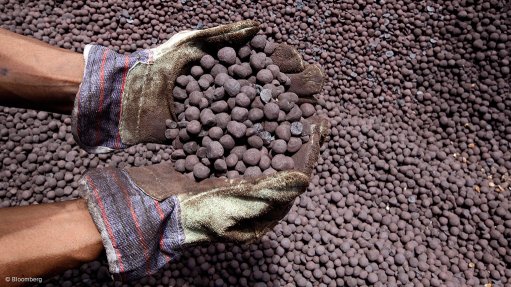Foreign acquisition divides Indian private and public sector companies
KOLKATA (miningweekly.com) - The Indian government has called upon domestic mineral and mining companies to step up the acquisition of overseas assets, again showing up strategic differences between public and private companies.
Addressing representatives from the sector, India’s junior Steel and Mines Minister Vishnu Deo Sai said: “We must start looking at overseas mining asset acquisition to gain global competitive advantage.
“This would go a long way in fulfilling the demand of various metals and mineral processing industries at home, which will grow by four to five times over the medium-term perspective, with a targeted contribution of 6% to the Indian gross domestic product over the next decade,” Sai added.
The government exhortations for greater exposure overseas have brought to the fore the sharp strategic differences in goals and performances between India’s private and public companies operating in the mineral sector. While the fprivate sector has fallen victim to the global downturn in the commodity cycle, government-owned and managed companies have been left to play the most prominent role in foreign investments in acquiring assets overseas.
Private sector majors Aditya Birla Minerals, JSW Steel, Tata Steel, and Jindal Steel & Power, have all been either unwinding their overseas investments or putting them in cold storage in the wake of the global commodity downturn. However, at the other end of the spectrum, government companies led by Coal India Limited (CIL), thermal power utility NTPC Limited, and oil and gas exploration and production company ONGC Limited have been fixated on the government’s exhortations, focusing on low commodity valuations to step up their foreign investment exposures.
According to a commodity business economist associated with the Steel and Mines Ministry, the government for its part did a lot of groundwork in establishing greater economic and business cooperation in natural resources during the recently concluded India-Africa Summit.
He said that bilateral relations between India and South Africa, Zimbabwe, Nigeria, Egypt and Sudan were strengthened during the summit, but it was quite apparent that government companies were better placed to tap opportunities than their private counterparts.
Explaining, he said that most private companies had ventured into overseas resource investments in times of commodity boom and higher valuations and, as a result, were hit harder by the downturn.
These same private investors were now unsure how long the downturn would continue and their stretched balance sheets were forcing either disinvestment from the acquired assets or cessation of operational investments, he said.
In contrast, government public sector resource companies, though late starters overseas, were entering the market on a downturn with valuations at rock bottom, and naturally sought the assets at more attractive valuations, he added.
Both CIL and NTPC were seeking joint ventures for coal assets in South Africa. At the same time ONGC Videsh, the overseas investment arm of ONGC Limited, was steadily increasing its investments in Mozambique, buoyed by recent law approved by the Mozambique Parliament enabling the latter to offer ‘cost recovery rights’ to investors for production of oil and natural gas fields in the African nation.
Over a series of rights acquisitions, ONGC Videsh had to date invested $4.13-billion in the Rovuma oil and gas assets in Mozambique. Last month, a consortium of Indian oil marketer Indian Oil Corporation Limited and Delonex Energy acquired rights to oil and gas reserves in southern Mozambique, though investments figures were not readily available.
In contrast, private companies such as Aditya Minerals hived off its interests in Mt Gordon copper mine in Australia. On similar lines JSW's acquisition of iron-ore reserves in Chile failed to add any economic value and the asset was presently under administration.
Tata Steel’s spate of raw material acquisitions across Mozambique, Côte d'Ivoire and Canada had turned sour forcing the steel producer to take impairments and investment write-offs.
Comments
Announcements
What's On
Subscribe to improve your user experience...
Option 1 (equivalent of R125 a month):
Receive a weekly copy of Creamer Media's Engineering News & Mining Weekly magazine
(print copy for those in South Africa and e-magazine for those outside of South Africa)
Receive daily email newsletters
Access to full search results
Access archive of magazine back copies
Access to Projects in Progress
Access to ONE Research Report of your choice in PDF format
Option 2 (equivalent of R375 a month):
All benefits from Option 1
PLUS
Access to Creamer Media's Research Channel Africa for ALL Research Reports, in PDF format, on various industrial and mining sectors
including Electricity; Water; Energy Transition; Hydrogen; Roads, Rail and Ports; Coal; Gold; Platinum; Battery Metals; etc.
Already a subscriber?
Forgotten your password?
Receive weekly copy of Creamer Media's Engineering News & Mining Weekly magazine (print copy for those in South Africa and e-magazine for those outside of South Africa)
➕
Recieve daily email newsletters
➕
Access to full search results
➕
Access archive of magazine back copies
➕
Access to Projects in Progress
➕
Access to ONE Research Report of your choice in PDF format
RESEARCH CHANNEL AFRICA
R4500 (equivalent of R375 a month)
SUBSCRIBEAll benefits from Option 1
➕
Access to Creamer Media's Research Channel Africa for ALL Research Reports on various industrial and mining sectors, in PDF format, including on:
Electricity
➕
Water
➕
Energy Transition
➕
Hydrogen
➕
Roads, Rail and Ports
➕
Coal
➕
Gold
➕
Platinum
➕
Battery Metals
➕
etc.
Receive all benefits from Option 1 or Option 2 delivered to numerous people at your company
➕
Multiple User names and Passwords for simultaneous log-ins
➕
Intranet integration access to all in your organisation


















